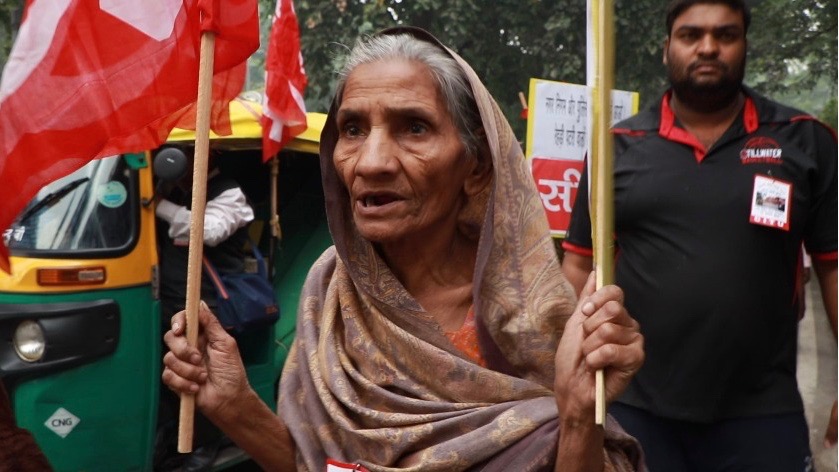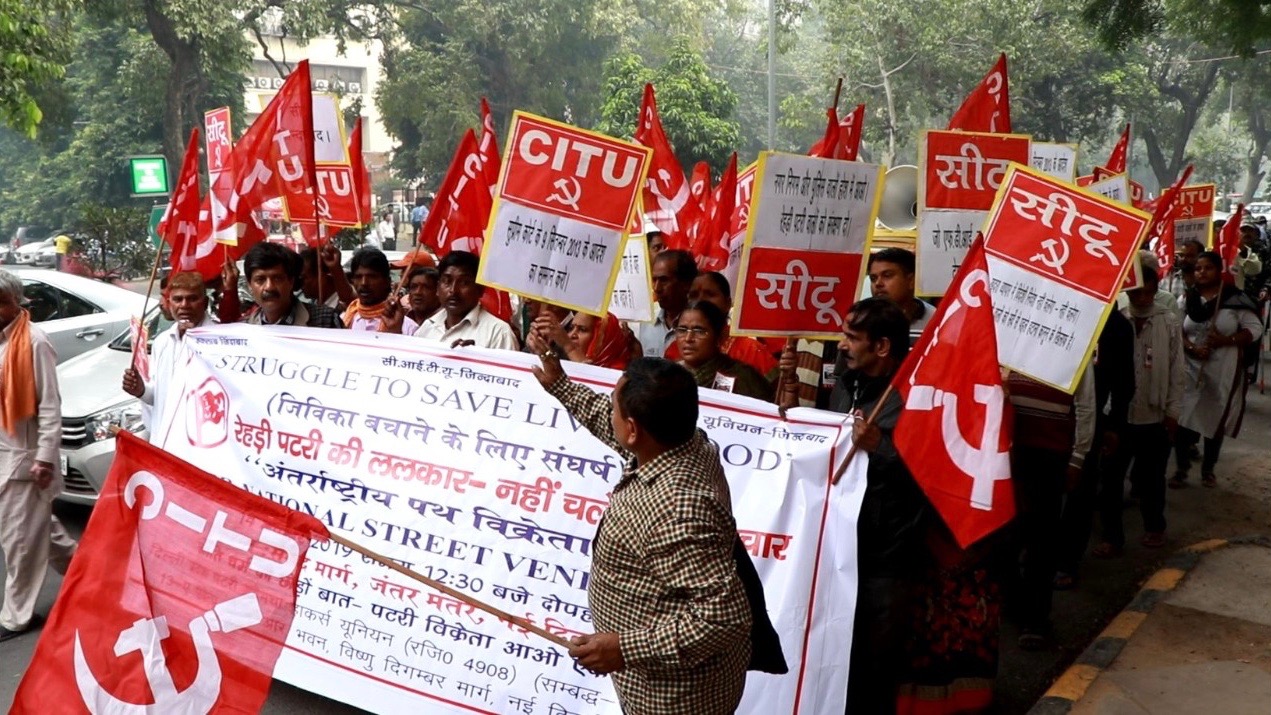Rallying beneath the red flags of the Center for Indian Trade Unions (CITU), street vendors in the capital city of New Delhi, organized under the Street Hawkers’ Union of Delhi, marched to the parliament street on November 14, the International Streets Vendors Day.
Street vendors are above all demanding the implementation of legal protections accorded to them by law against their extortion and eviction by police and municipal authorities. They also spoke out against Foreign Direct Investment in the retail sector.
“After the first celebration of this day in Africa in 2012, November 14 has now come to be recognized as the Street Vendor’s Day internationally. Only because of sustained militant struggles by hawkers across the world, who have braved the police batons and water cannons in their struggle to have their rights recognized,” the union’s secretary, Shakeel Ahmed, told the hawkers who gathered at parliament street for a demonstration after the march.
“Just like you suffer at the hands of police and municipal authorities,” he added, “street vendors in Africa too were being continuously harassed. Then they came together with the support of organizations like War on Want, the Malawi Union and Street Net, and fought unitedly, putting forward three crucial demands: an end to harassment, the right to unionization and the protection accorded by labor laws, and access to a hygienic and healthy work environment for vending, with access to toilets, running water and waste disposal facilities.”
Similar struggles, he said, have been ongoing in India for decades, following which, the Supreme Court finally passed a judgement in 2013, prohibiting the police and municipal authorities from evicting or extorting street vendors until all of them are registered after a survey and authorized vending zones are created for them to sell in a formal setting.
The judgement reads, “All the existing street vendors/hawkers operating across the country shall be allowed to operate till the exercise of registration and creation of vending/ hawking zones is completed…Once that exercise is completed, they shall be entitled to operate only in accordance with the orders/directions of the concerned town vending committee.”
Following this judgement, early in 2014 just before the far-right BJP ascended to power, the Street Vendors Act, 2014, was passed, emphasizing that street vending is a legitimate profession.
The act mandated the formation of Town Vending Committees (TVCs), comprising of representatives from the concerned state government, municipality, traffic police and street vendors themselves. The task of TVC is to complete the survey of the hawkers and work out a plan to set up free vending zones, restricted vending zones and non-vending zones.
The vending zones are also to be provided with the relevant civic amenities such as toilets, water-supply, waste management infrastructure etc.
Little progress has been made in this direction since then, and in most states, no progress at all. Harassment and extortion by police and municipal authorities continue unabated. One such victims at the rally was Sheila, a frail 70 year old woman who has been single-handedly raising her child, who is now 18 years of age, in a make-shift roadside tent.

She sells tea and the common North Indian meal of roti, dal and subzi at Rs. 40 a plate. The price of onions and tomatoes, which forms the base of most vegetable preparations, has skyrocketed over the last few months. But Sheila cannot raise the price she charges per plate because most of her customers, who are from the poorest sections of the city, cannot afford to pay.
“I am barely managing to get through, with no savings to show by the end of the month,” she said. Two months ago, the municipal authorities seized her gas cylinder, accusing that she was making illegal use of the streets by vending there. She had to pay them Rs.1,500 to have it released.
Street Vendors in Delhi lose almost 30% of their annual income to extortion and harassment by authorities
Other vendors complained that their already dwindling income, due to competition from large Indian and foreign brands who have entered the retail sector, is further sapped by regular extortion by police, who throw their goods to the ground and upturn their push carts if the money is not paid.
A 2015 study by the Center for Civil Society, based on eight markets in Delhi comprising of 8,150 street vendors, found that a hawker loses an average Rs 1,76,238 (which was then equal to $2651.39) every year. This amounted to almost 30% of the annual income lost to paying bribes, penalties, affidavit charges and costs incurred due to goods damaged during evictions.
The Ministry of Urban Development & Poverty Alleviation, in its National Policy for Urban Street Vendors, 2004, considered 2.5% to be the average percent of a city’s population who make their livelihoods as street vendors.
Delhi’s population was estimated to be 16,314,838 in the national census which was last conducted in 2011. 2.5% of this population would mean the number of street vendors in the city are 407,871. “Therefore, total loss of Street Vendors in Delhi…is Rs. 71,88,23,84,311 or $10,814,273,423 per year,” states the working paper titled ‘Street Vendors Act 2014: A Forgotten Promise?’
The figure is much higher today because Delhi’s population has grown sharply since 2011. There is also a high possibility that the percentage of the city’s population who rely on street vending has increased considerably, because massive job-losses across sectors in the recent years have been forcing an increasing portion of the working population to rely on self-employment.
“On the one hand, the government, in its pursuit of neoliberal policies, has brought the unemployment level in the country to a record [45-years] high. Even the [millions of] job vacancies in government posts are being scrapped. We’re being told to find self-employment,” said CITU Delhi’s Secretary, Siddheshwar Shukla.
On the other, he added, “the police are let loose on the street vendors who are making an honest living out of self-employment by providing the city’s working class with cheap and fresh consumables.”
Police harassment of street vendors is a conscious policy to make way for malls and supermarkets of big brands, unionist alleges
Recently, after the Supreme Court’s order on September 2 instructing the authorities to clear illegal encroachments by residential properties onto pavements and other public spaces, the police and municipality evicted hundreds of street vendors from market spaces, despite a stay order by the High Court against doing so.
Moreover, most street vendors use movable carts or sell their products on a sheet cloth spread out on the pavements. These are not regarded as encroachments, Shukla insists.
“It is not out of some innocent [misrepresentation of the court order] that the authorities have been harassing the street vendors,” said Anurag Saxena, the General Secretary of Delhi CITU. “It is a conscious policy of the government to make way for large corporations and big brands to build their malls and supermarkets. Can the city’s poor and working-class afford to buy their daily consumables from there?” he asked.
Police in Delhi are controlled by the BJP-led central government, and not by Delhi’s state government ruled by the centrist Aam Aadmi Party, who has some pro-people policies.
When the trade unionists and senior leaders from the Communist Party of India (Marxist) approached the state government while the “police were charging at vendors with their batons”, they were assured that the survey will be completed quickly, and the vendors would be regularized. “Where is that survey?” they demand to know.
“The International Street Vendors day in India is not only an occasion for celebration, but also for protest,” Shukla asserted.
Virender Gaur, President of Delhi CITU declared, “We should take an oath on this day that a police baton raised against any one vendor will be met by the resistance of the entire street vendors’ community.”
Shakeel, the secretary of the Street Hawkers’ union of Delhi said, “the next time the municipal authorities arrive at the market places to extort the vendors and seize their belongings, we will not quietly resign to our fate anymore. We will put up a militant resistance and block the entry of their vehicles.”
Saxena pointed out that today it is not only the livelihood of street vendors that is under assault by the government’s neoliberal policies, but that of the entire cross-section of the toiling masses. As such, Saxena called on street vendors to join en masse in the strike action on January 8, called by ten central trade unions in the country.





